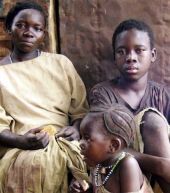Peace opens roads in southern Sudan
By MOHAMED OSMAN, Associated Press Writer
WAU, Sudan, Mar 4, 2005 (AP) — The end of fighting in southern Sudan opened the road to home and family for 20-year-old Paul Baleo, and he is not alone.

|
|
Susana John, 22 and her daughter of 4 and an unidentified relative are seen in Wau, southern Sudan Wednesday March 2, 2005. John’s husband was killed in September, 2001 in fighting over the town of Raja, northwest of Wau. (AP) . |
“I can tell you that there are many people now … moving in all directions. Everybody wants to find their relatives,” says 20-year-old Baleo, who was separated from his mother, father and brother by fighting 13 years ago and was reunited for the first time last month after peace made it possible to travel freely.
Baleo and his grandmother did not even know where the others had fled when fighting broke out between the government and the Sudan People’s Liberation Army around his hometown of Tombura, near the Central African Republic Border.
Then came the Jan. 9 peace deal, and, slowly, southerners began to move freely in an area where government and rebel land mines and roadblocks had made travel treacherous during the 21-year-war between the Arabicized, Muslim north and the African, heavily Christian south.
Travelers arriving in Tombura told Baleo, whose grandmother died several years ago, that his family was 250 kilometers (150 miles) away in Wau _ and that his mother, who had last seen him when he was six years old, was looking for him.
“I took my chances and moved from Tombura,” he said. “I moved with no food. I walked at daytime and slept in the evenings. I ate mango and wild plants. I just kept on walking until I reached Wau.”
The journey last month took six days, he said. When he reached the outskirts of Wau, he was met by local residents who, in the tradition of rural Sudan, questioned him about his tribe, clan and sub-clan.
Baleo’s family were members of the Zande tribe, so they stood out in an area where most people are Balanda. Soon, Baleo was being directed to the home of his uncle, where his immediate family had been living since fleeing Tombura.
“We did not recognize each other at first. It had been such a long time. When we met, there was no talking. It was only tears and tears, tears kept on rolling,” Baleo said.
Government and U.N. officials have noticed large numbers of southern Sudanese on the move, but say they have no figures.
When the government and rebels first signed their peace deal, southerners were at first wary. Then a U.N. polio campaign brought government officials and international workers to the area, and people began to think that perhaps the peace was real.
Joanna VanGerpen, a UNICEF official in the south this week to help organize the polio campaign, said people should profit from the current climate of trust and peace and build on it, providing services to the areas destroyed by war and fighting “so that when people come they will find at least the basic services they had before.”
Baleo found more than enough, and plans to stay with his family in Wau. He has a job as a mechanic’s assistant in the garage where his cousin works, and where he spoke to The Associated Press as his cousin looked on, nodding.
Susana John, 22, and her four-year-old daughter also trekked six days from Tombura to Wau. After her long journey, dust had turned her white scarf the color and stiffness of a dry piece of bread.
John’s husband was killed in September, 2001 in fighting over the town of Raja, northwest of Wau. All the civilians inside Raja were moved toward SPLA-controlled Tombura, with the SPLA at the time accusing the government of using civilians as shields.
John remained there for the last four years, feeding herself and her child by laboring on other people’s farms. Now, she said, speaking on the outskirts of Wau, she hoped to find relatives and work on their farm.
“Peace is good. It saved me from a place I did not choose, and I am going home. You never feel tired when going home,” she said.
